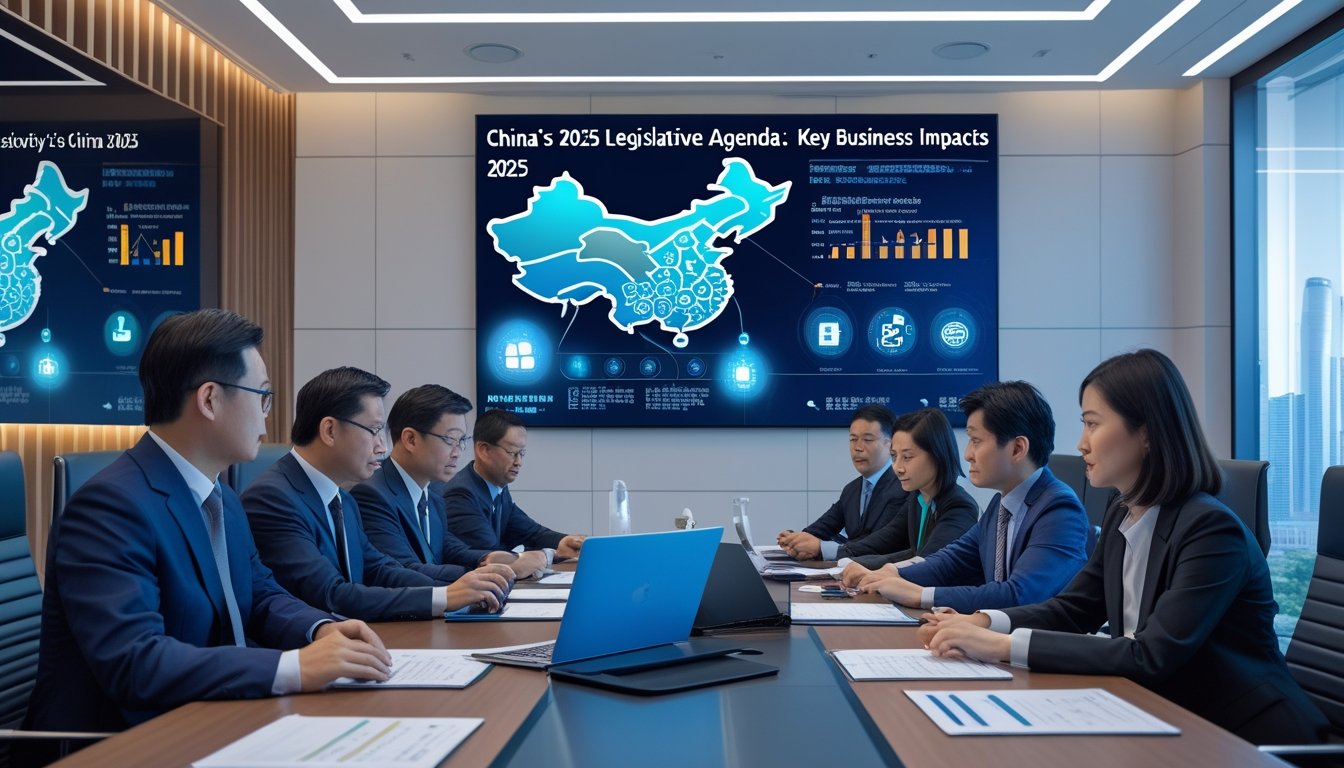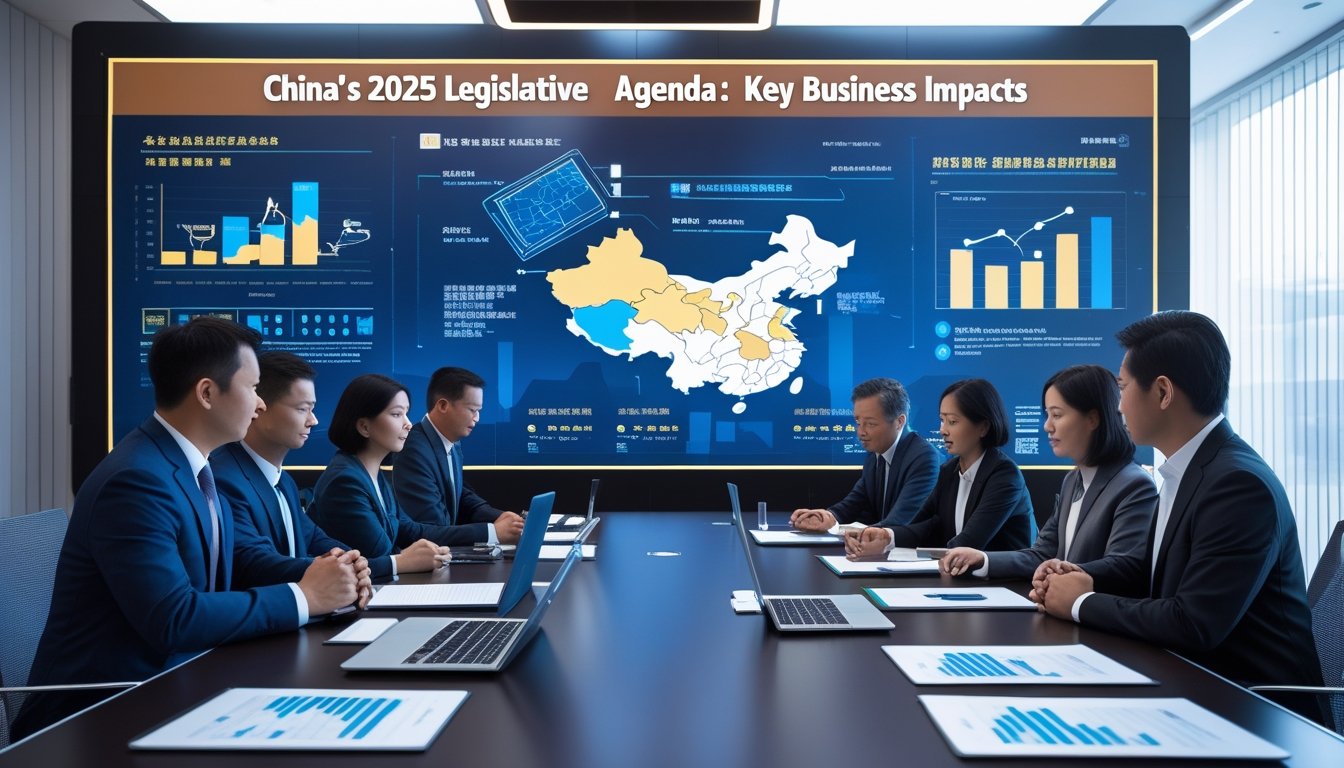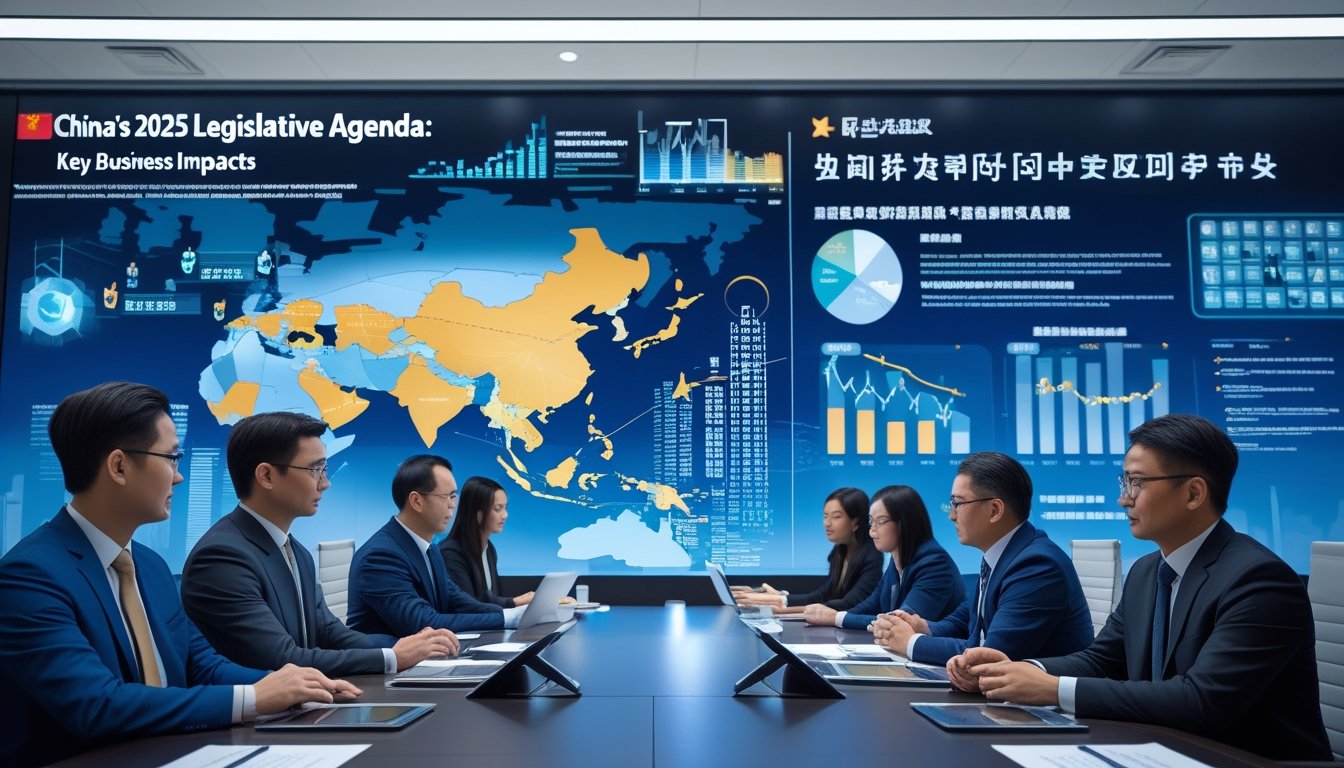China’s 2025 Legislative Agenda is set to introduce reforms that will shape the country’s business environment for years to come. From regulatory updates to industry-specific measures, the agenda reflects Beijing’s priorities for economic growth and governance.
For companies operating in or with China, these changes bring both opportunities and challenges. Compliance requirements may tighten, while new policies could open doors in emerging sectors.
Understanding what’s on the horizon in China’s 2025 Legislative Agenda is essential for businesses that want to stay competitive, manage risk, and plan strategically.
Want to see how past reforms shaped today’s business climate? Read our insights on China and the Open Door Policy.
What Is China’s 2025 Legislative Agenda

China’s 2025 legislative agenda lays out new laws and updates aimed at tightening economic governance, keeping up with new industries, and boosting oversight in areas tied to both foreign and domestic growth. These changes reach into business operations, social policy, and the broader legal climate.
Overview of Planned Legal Reforms
The government’s list for 2025 includes some big draft laws and amendments. The National Development Planning Law stands out—it’s meant to give long-term economic strategies some legal teeth and connect national goals to enforceable rules.
The Social Assistance Law is also on the table, aiming to make welfare and support systems more effective. It’s about making sure aid gets to people who need it and tightening up how social safety nets work.
Revisions are coming for the Foreign Trade Law, Trademark Law, and Road Traffic Safety Law. Expect updates on intelligent driving tech and stronger protections for intellectual property. These reforms blend economic modernization with a few social tweaks.
Focus Areas for Business and Investment
For business leaders, the agenda zeroes in on areas that hit investment and day-to-day operations. Changes to the Foreign Trade Law will affect how you handle cross-border deals and compliance. Better trademark protections should help cut down on infringement headaches.
Tech and innovation are front and center. If you’re in automotive, logistics, or digital, be ready for clearer but tighter standards—especially around intelligent driving and data governance.
There’s also a push to make the business environment friendlier for innovation and talent. That could mean new chances to grow, but you’ll want to keep an eye on higher compliance bars.
Government Priorities Driving the Agenda
This legislative plan is tied to China’s bigger goals. The government is pushing for high-quality development and a high-standard socialist market economy. Laws like the National Development Planning Law are meant to back up growth strategies with real legal authority.
Foreign-related laws are a big part of this, too. Rules linked to the anti-foreign sanctions law and government data sharing show a clear intent to protect national interests and manage outside risks.
Science, education, and culture are getting more legal attention as well. The thinking seems to be that these areas are key to staying competitive and stable. By tying these priorities into law, the government’s sending a message about where it wants both local and foreign businesses to focus.
How the Agenda Impacts Businesses
China’s 2025 legislative agenda puts stricter compliance front and center, with more oversight for foreign-related business and targeted reforms in key industries. All of this is meant to support the country’s high-quality development goals and shape how companies operate and plan.
Compliance and Regulatory Adjustments
Get ready for tighter rules on data protection, corporate governance, and financial reporting. Draft laws like the National Development Planning Law and new private economy rules show that the government wants to formalize oversight.
You’ll probably need to update your internal controls, reporting processes, and how you manage data. If you’re in tech or finance, expect more audits and tougher disclosure standards.
These new frameworks also put more accountability on executives. Board responsibilities and risk management are getting more attention, so while compliance might get pricier, at least the standards should be clearer.
Effects on Foreign Investment and Trade
Foreign investors are looking at a mix of new chances and tighter limits. China’s still opening up some sectors to foreign capital and know-how, but laws around national security and foreign affairs could make market entry tougher or require extra approvals.
If you depend on cross-border operations, keep a close eye on trade law changes. Foreign companies might have to deal with stricter reviews for mergers, acquisitions, and joint ventures.
The government’s push for a high-standard socialist market economy could bring more predictable rules in certain areas, but you’ll also see more scrutiny in sectors tied to sensitive tech or supply chain security.
Sector-Specific Opportunities and Risks
The legislative agenda spotlights sectors like digital tech, green energy, healthcare, and advanced manufacturing. If you’re in these spaces, you might benefit from clearer legal frameworks or better IP protections—and maybe some policy perks.
But new rules can mean higher risks, too. Stricter environmental standards could bump up costs for manufacturers, while tougher data laws might challenge digital service providers.
Examples of sector impacts:
- Technology: beefed-up data protection, more cybersecurity reviews
- Energy: tighter emissions rules, new chances in renewables
- Healthcare: clearer drug approval processes, stricter compliance for foreign firms
It’s worth digging into these sector shifts so you can plan around both the risks and the opportunities.
Concerned about global trade tensions? Learn more about China’s retaliatory tariffs and their impact on businesses.
Legal Strategies for Companies in China

China’s legal landscape moves fast, and new rules can hit everything from governance to contracts to compliance. Careful planning, solid operations, and timely legal help are your best bets for staying on track and out of trouble.
Anticipating Policy Changes Early
Don’t wait until new laws are in force. Keep an eye on draft legislation and government updates. The State Council’s legislative plans usually preview changes to company law, data protection, and competition rules. If you spot these early, you can tweak your policies and get compliance programs ready before the rush.
Set up a system to track updates from official channels like the National People’s Congress, State Council, and industry regulators. Relying on post-enactment news? That’s asking for last-minute headaches.
Assign clear responsibilities in your company. For example:
This setup helps you act before changes cause problems.
Structuring Contracts and Operations
Build some flexibility into your contracts and operations. For example, if the Company Law gets stricter on shareholder rules, you might need to update capital contribution agreements. Including renegotiation or adjustment clauses can help you adapt to new laws without scrambling.
On the operations side, check if your supply chain, data systems, and finances line up with upcoming rules. If you handle personal data, you should already be working China’s data localization and security review requirements into your IT routines.
Try these steps:
- Update contracts to allow compliance-driven changes.
- Review governance docs to match new shareholder accountability rules.
- Audit data practices for Personal Information Protection Law compliance.
Getting ahead of these changes can help you avoid disputes and regulatory trouble.
When to Seek Professional Legal Guidance
Some rules are just too complex or carry too much risk to navigate alone, especially if they touch on cross-border business. Mergers that need anti-monopoly review, investments in restricted industries, or cross-border data transfers under PIPL—these are times to get legal advice.
Local lawyers know how national laws play out in different regions or industries. International firms can help with the big picture, but local expertise is crucial for filings and approvals.
If you bring in legal advisors early, they can spot issues before you run into delays—like when you’re applying for foreign investment and need to clear national security reviews.
It’s smart to get professional help when:
- You’re entering sensitive industries (think telecom, energy, AI).
- Restructuring your company or changing your capital setup.
- Facing audits or investigations from the government.
It’s just easier to solve problems before they turn into expensive disputes.
Navigating upcoming reforms requires expert support. Explore our full range of legal services in China to protect your business.
Conclusion: China’s 2025 Legislative Agenda
China’s 2025 Legislative Agenda will play a pivotal role in shaping the regulatory and commercial landscape. Businesses that monitor these developments closely can better anticipate compliance needs and seize new opportunities.
Whether it’s adjusting contracts, planning investments, or navigating sector-specific regulations, proactive legal strategies are essential. Companies that prepare now will be more resilient as reforms take effect.
For further insights into how government policy influences business, read our article on China’s stimulus measures.
Frequently Asked Questions
In 2025, expect laws and policies focused on economic planning, industry development, and tighter regulation. These will affect both local businesses and foreign companies in China.
What is the China 2025 plan?
The China 2025 plan is the legislative and policy roadmap set by the State Council and National People’s Congress for the year. It covers drafting or revising laws around national development, private sector growth, trade, data protection, and foreign-related issues.
What is Made in China 2025 agenda?
Made in China 2025, rolled out in 2015, is about upgrading China’s manufacturing sector. It targets innovation, advanced tech, and cutting reliance on foreign imports in industries like robotics, aerospace, and clean energy. By 2025, you’ll see more laws and regulations to back these goals.
What is China's macroeconomic policy 2025?
China’s macroeconomic policy for 2025 is all about stability, quality growth, and stronger regulation. The government links new laws to long-term development, tighter financial rules, and support for emerging industries. Expect stricter controls on data, foreign trade, and the environment as part of this approach.
What is the growth goal of China in 2025?
China’s government aims for GDP growth of about 5% in 2025. Instead of chasing breakneck expansion, they're leaning into steady progress. There’s a clear push for more productivity, innovation, and sustainability—basically, trying to keep growth balanced and not so tied to heavy industry or property markets.
Subscribe to receive updates
Subscribe to receive the latest blog posts to your inbox every week.






